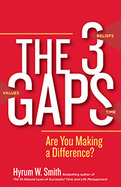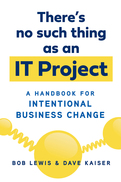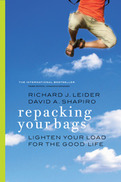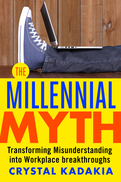2015
We all want to make a difference. But just as you need to put on your own oxygen mask before helping other passengers on an airplane, getting your own life together is the first step to making a positive impact in the world. Franklin Covey cofounder Hyrum Smith shows that what stops us are gaps between where we are and where we want to be. The first is the Beliefs Gap, between what we believe to be true and what is actually true. The second is the Values Gap, between what we value most in life and what we actually spend our life doing. The third is the Time Gap, between what we plan to do each day and what we actually get done.
Smith offers a practical blueprint that we all can use to recognize and close each of these three gaps and illustrates how it can be done through inspiring true stories. The 3 Gaps provides the concepts and the tools needed to establish a solid foundation from which you can help make the world a better place.
Too many businesses miss opportunity after opportunity to design, plan, and achieve intentional business change. Why? Because they charter projects focused on delivering software products: IT projects. But as this groundbreaking book points out, there's no such thing as an IT project—or at least there shouldn't be. It's always about intentional business change, or what's the point?
It's time to stop providing simplistic, one-dimensional, all-you-gotta-do panaceas. When the only constant in business is change, truly useful IT has to help you change instead of build solutions that are obsolete even before they are completed.
IT consultant Bob Lewis, author of the bestselling Bare Bones Project Management, has joined forces with seasoned CIO Dave Kaiser to give you the tools you need. It's a multidimensional, relentlessly practical guide. Condensed to handbook length and seasoned with Lewis's trademark sardonic humor, it's an enjoyable and digestible read as well.
Lewis and Kaiser take you step by step through the process of building a collaboration between IT and the rest of the business that really works. Insisting on intentional business change takes patience, communication, and courage, but it has a huge payoff. More to the point, insist on anything else and every penny you spend will be a wasted dime and a waste of time.
America's #1 progressive radio host looks at how elites have long tried to disenfranchise citizens—particularly people of color, women, and the poor—and shows what we can do to ensure everyone has a voice in this democracy.
In today's America, only a slim majority of people register to vote, and a large percentage of registered voters don't bother to show up: Donald Trump was elected by only 26 percent of eligible voters. Unfortunately, this is not a bug in our system, it's a feature. Thom Hartmann unveils the strategies and tactics that conservative elites in this country have used, from the foundation of the Electoral College to the latest voter ID laws, to protect their interests by preventing “the wrong people”—such as the poor, women, and people of color—from voting while making it more convenient for the wealthy and white. But he also lays out a wide variety of simple, commonsense ways that we the people can fight back and reclaim our right to rule through the ballot box.
2012
People everywhere feel overwhelmed today—weighed down by countless responsibilities and buffeted by never-ending changes in their personal and professional lives. Repacking Your Bags shows readers how to climb out from under these burdens and find the fulfillment that is missing in their lives.
“Living in the place you belong, with the people you love, doing the right work, on purpose.” This is how Richard Leider and David Shapiro define the good life. Technological advancements, economic shifts, and longer lifespans mean most of us will need to repeatedly reimagine our lives. In this wise and practical guide, Leider and Shapiro help you weigh all that you're carrying, leverage what helps you live well, and let go of those burdens that merely weigh you down.
This third edition has been revised with new stories and practices to help you repack your four critical “bags” (place, relationship, work, and purpose); identify your gifts, passions, and values; and plan your journey, no matter where you are in life.
-
New edition of the classic bestsellerover 500,000 copies sold and translated into seventeen languages
-
An indispensable tool in the lifelong journey of living a purposeful life
-
Thoroughly revised and updated with new stories, exercises, and tools
The first and second editions of this classic book showed readers how to develop their own unique vision of the good lifewhich Leider and Shapiro define as "living in the place you belong, with the people you love, doing the right work, on purpose"and take practical steps to achieve it. Inspired by a spirit of travel and adventure, it uses packing and repacking your bags as a metaphor for deciding what you really need in your journey through life.
So why a third edition? Because the world has changed. When they wrote the first two editions, Leider and Shapiro assumed that repacking was something people might do once or twice in their lives. But technological advances, major economic shifts, longer life spans, and changing social roles are revolutionizing the way we live and work. Today we have to repeatedly unpack and repack as the inevitable shifts and surprises life has to offer continually unfold before us. With each step along the way, we must reexamine what has brought us here and continue asking ourselves if the choices that have sustained us so far are continuing to do soor if they're just weighing us down.
This new edition has been thoroughly revised and reimagined with this lifelong focus in mind. It contains new stories and practices for repacking your four critical "bags"place, relationship, work, and purposeas well as a new Repacking Journal for planning your "trip" and Leider's immensely popular Calling Card exercise for identifying your gifts, passions, and values. Repacking Your Bags reminds all of us to regularly ask why we carry what we do and try to lighten our loadsbecause the good life is worth striving for at every age.
What sets this book apart from similar titles
- Another book in this genre is The Happiness Project, but it focuses on the author's personal journey, making it a good fit mostly for readers who share the author's personality. Repacking Your Bags is a happiness book that applies to a wide range of people and personalities.
- Books like the Power of Less suggest you approach happiness through simplification and efficiency, whereas Richard Leider points to deeper themes such as finding one's true purpose or calling.
- And the book Stumbling on Happiness devotes many pages to the psychology and neuroscience of unhappiness, which leads to some interesting insights but is less focused on practical, easy-to-implement advice.
2017
Millennials have been condemned as lazy, entitled, disloyal, and disrespectful and needing constant hand-holding. But Crystal Kadakia—a Millennial herself as well as an organizational development consultant and two-time TEDx speaker—shows that not only are these negative stereotypes dead wrong, but each one conceals a positive workplace practice that forward-looking companies must adopt if they are to endure. She illuminates how the advent of digital technology is the crucial root cause of many Millennial behaviors and offers a guide for what our traditional workplace needs to do to attract, engage, and retain modern talent.
Millions have found mindfulness to be a powerful practice for reducing stress, enhancing attention, and instilling tranquility. But it can offer so much more—it can transform you, make you more fully awake, alive, and aware of your connection to all beings. In Japanese, the character that best expresses mindfulness, 念, consists of two parts—the top part, 今, meaning “now,” and the bottom part, 心, meaning “heart.” Using stories from his own life as the son of an Irish father and a Japanese mother, a professor in Japan and America, a psychotherapist, a father, and a husband, Stephen Murphy-Shigematsu describes eight “heartfulness” principles that help us realize that the deepest expression of an enlightened mind is found in our relation to others.





















